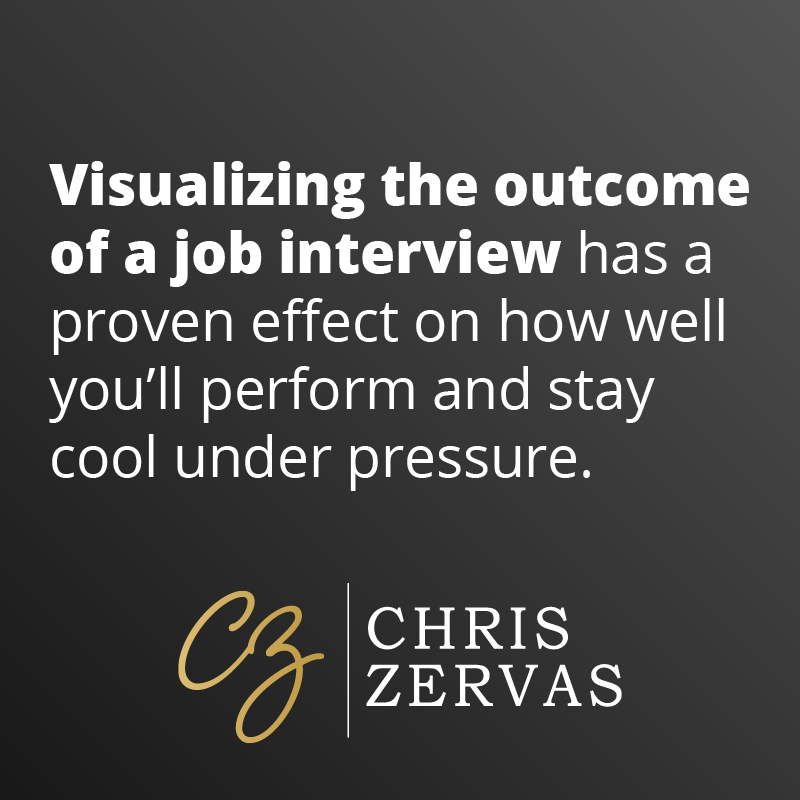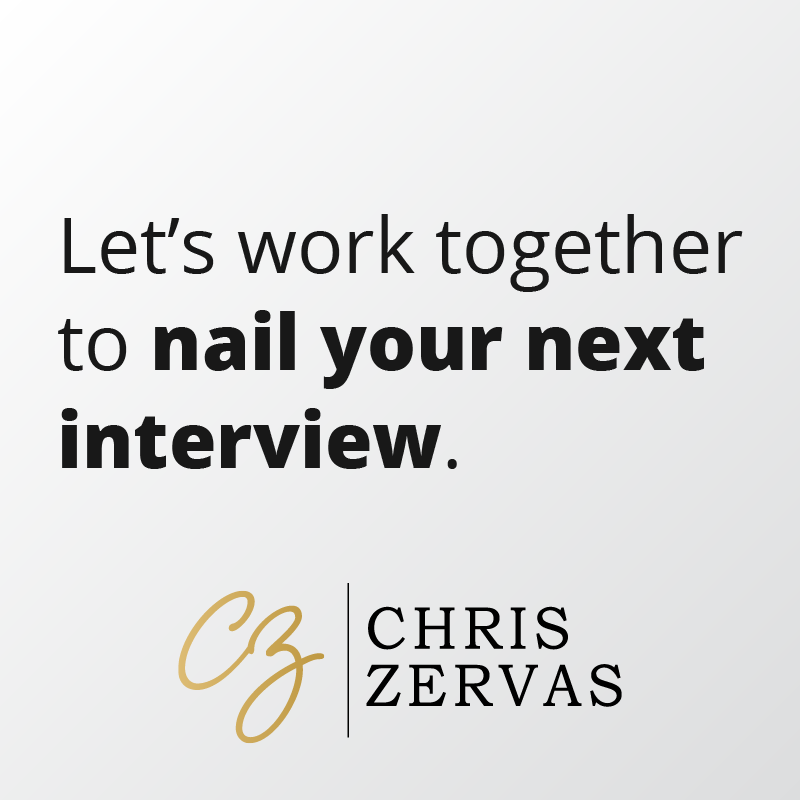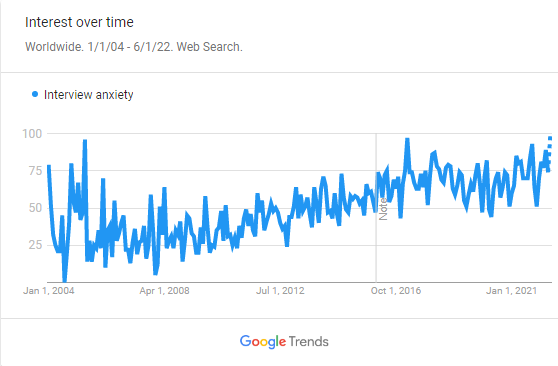
Here's what we'll cover:
You’ve submitted dozens — if not hundreds — of resumes, custom cover letters, and you’ve re-typed the information from your resume into more online forms than you can count.
And there it is: the email reading “We’d love to interview you!”
The excitement swirls, the sense of opportunity washes over you, and you feel that sense of progress. You might call and tell friends and family, each congratulating you and sharing in that moment of your success.
But all the while, just in the back of your mind, there’s a sinking feeling. You’ve felt it before and eventually, that small feeling becomes a constant weight in your chest, all leading up to the big day: job interview anxiety.
Is any of this feeling familiar? If so, don’t worry. You’re just like the vast majority of the world’s job seekers.
But there the make-or-break difference lies in how you frame the interview in your mind, how you mentally and emotionally prepare, and how you learn to dance with your anxiety rather than try to shove it down into a bottle.
You’re in the right place. So let’s take a deep breath and dive into how you can mentally and emotionally prepare for a job interview and better manage your interview anxiety.
How to Mentally Prepare for a Job Interview
Job interviews are certainly a big moment in life. They lead to new opportunities, new careers, and new paths that can allow us to change our lives for the better.
Naturally, that’s going to come with some degree of mental weight. While the size of that weight is going to be different depending on your circumstances, it’s still a mental load to bear.
The key here is to not look to artificially diminish the significance of the interview in your life, but to mentally build yourself up whereby you can have concrete self-assurance that you’re qualified, capable, and a bringer of legitimate value to the company.
Know that you’re not alone in your job interview anxiety.
For nearly 20 years, the number of people looking for help with their job interview anxiety has surged worldwide.
Please know you’re objectively not alone in this struggle.
There’s millions of people the world over, just like you, who are having the same thoughts, feelings, and who are doubting themselves and their abilities, even though they’re perfectly qualified.
Simply knowing you’re not alone and that the emotions and thoughts you’re facing are normal is a great comfort and is the first step towards preparing yourself for your interview and overcoming your anxiety towards it.
Recall your past successes and remind yourself of your value.
In a job market where you’re competing against more people than ever, it’s easy to fall into the trap of imposter syndrome.
In a nutshell, imposter syndrome is the feeling that you’re a fraud. Deep down, you don’t feel like you deserve any of the recognition, promotions, or career advancement that you’d achieved because you feel incompetent. You secretly fear that one day, someone actually competent will get wind of your existence at your workplace and out you for the out-and-out fraud that you are.
Feel familiar? Again, you’re not alone. This is perfectly normal.
In reality, imposter syndrome is actually a trait of those who are some of the best and brightest in their field, as wanting to be free of these feelings is what drives many professionals to constantly strive to be better and truly be the outstanding experts in their field.
Armed with this knowledge, find old industry awards, emails about promotions, or even praise from customers, supervisors, or colleagues. Assembling these positive reminders that you do care about your job, your improvement, and the best outcomes for those you serve is a powerful antidote against imposter syndrome and interview anxiety.
As you talk about your successes, it is best to do so in a story form. Stories stick. Facts bounce. Try to tell your success story in 60-90 seconds. Remember, this is not a monologue, it is a conversation.

Visualize the interview going perfectly.
Visualizing the outcome you’re wanting from a situation, like a job interview, has a proven effect on how well you perform and how cool you stay under pressure.
In the days leading up to your interview, envision yourself confidently engaging your interviewers, answering their questions, and practice feeling the emotions of nailing the interview.
Though a simple exercise, it’s a powerful tool to help you mentally lay the groundwork for success and help abate the natural feelings of anxiety that will try to take hold as your interview day approaches.
Practice questions and mock interviews.
Acting hand-in-hand with visualization, working through practice interview questions and mock interview sessions with a coach is a sure-fire way to calm your nerves and help you feel more prepared.
When practicing, it’s never a bad idea to treat it as a full and proper rehearsal. Dress as you would for the interview, set up a dedicated space for the interview practice in your home or reserve a small space in a more professional setting, and run through the questions you anticipate them asking.
Websites like Glassdoor, Indeed, Monster, and other job-focused sites can be a great resource to look for interview questions more tuned to your specific role. With these questions, you can develop aids like flashcards to help you hone your delivery skills.
Honestly assess your strengths and weaknesses.
Regardless of the industry or technicality of your role, this is also the time to focus on truly assessing your strengths and weaknesses.
Interviewers typically shy away from candidates who lack self-awareness and who aren’t able to identify where they professionally excel and fall short.
Self-honesty and professional transparency are a must here. Rather than milquetoast answers like “I work too hard,” a more genuine and insightful response might be:
“I have a tendency to accidentally overburden myself when I see an opportunity to help. I put too much on my plate, and in times past, not setting clear boundaries or expectations has caused me to let people down.”
Most importantly, don’t simply state your weaknesses without also shining a light on how you’re working to improve those shortcomings. For instance, if you know you tend to overload yourself in an effort to please supervisors or help co-workers, follow up with something like:
“And I recognize that, while I’m trying to be helpful, it’s ultimately a disservice to the team and myself. So rather than just flatly agree to more and more, I’m now making the effort to say no when more work is simply unfeasible, or should an emergency arise, chart out a measured plan of attack so everyone’s on the same page and no one ends up being let down.”
Companies worth working for will respect your honesty and your self-awareness.
Research the company thoroughly.
You’ll have likely already mapped out a bit of information about the company when you were in the early stages of your job search; however, once you’ve landed the interview, it’s time to really get digging.
Whether it’s LinkedIn, Glassdoor, Indeed, or any of the multiple review and company informational hubs out there, try to get a feel for not only the position you’ll be applying for, but what success looks like in that role.
By getting to know the company better, you’re able to better understand what they’re looking for in an ideal candidate. With that information, you can place yourself in your interviewers’ shoes and know what you would be looking for in a candidate.
Equipped with this insight, you’ll feel an empowering sense of scope and clarity as you walk into the interview with a solid understanding of what your goals are, what the company’s looking for, and a clear plan as to how you’ll sell yourself as the perfect fit.
Map out and practice your route to the job interview location.
Before the day of the interview, take the time to make sure you know exactly how to get to the interview location. There’s nothing worse than potentially blowing a first impression by being late.
Don’t put it off by relying on your car’s GPS or apps like Google Maps. While you should absolutely use those if you have them, you never know when a technical error might strike that may take those options off the table.
Take an afternoon, drive to the interview location, and the stress of getting there on the interview day will melt away.

How to Emotionally Prepare for a Job Interview
While mental preparation is vital, overcoming job interview anxiety also relies on you emotionally preparing yourself for the task ahead.
Let’s dive into a few helpful steps you can take to get your mind and heart in alignment before the big day.
Remember the value you’re bringing to the company.
In your mental preparation and research, always look back to the accomplishments you’ve achieved.
Yes, imposter syndrome might try to get the best of you and try to convince you that you’re not truly qualified to be in that chair and sitting in front of those interviewers.
Remember: Your interviewers aren’t dumb. They’ve got just as much incentive to make sure they get this hire right, as well. If they have to go back and begin this search all over again, they might have to answer to their supervisors for making a poor hire.
This is a key point to the interview process. The interview is really not about you. It’s about them. Keeping this frame of mind is key to success in an interview.
But you were chosen for a reason. That selection committee, CEO, or whoever chose you used their best professional judgment to select you. Your work, your spirit, and your drive is what got you here.
In your research and mental preparation, you’ve gotten a better understanding as to what they’re looking for in a qualified candidate and hire. You know their motivations, your strengths and weaknesses, and why you’re the right candidate for this job.
Your accomplishments aren’t a fluke. Your strengths aren’t a fraud. And their decision to get to know you better as a potential member of their workforce isn’t a mistake. You’re here because you can provide them with the value they’re looking for.
Recognize that your anxiety comes from you wanting to help and excel.
Your anxiety isn’t the sign of a weak mental or emotional constitution. In fact, it’s quite the opposite: Researchers have found that social anxiety is usually a good indicator of higher levels of empathy and care for others.
As you work through your preparation, remind yourself of this to ground yourself in times where you feel swept away by your anxiety.
You’re feeling these emotions and discomfort because you’re yearning to truly be of service, help others, be a blessing to those around you, and to excel in this new role.
Embrace the presence of your anxiety.
Rather than trying to shove your anxiety into a bottle, research has shown that it’s often best to embrace the fact that it’s present.
Even if you follow all the steps we’ve laid out to the letter, there’s no question that you’ll still feel some level of anxiety, especially on the day of the interview.
It isn’t the goal, nor the healthy thing to do, to try and pretend it’s not there.
Leaning into the anxiety, recognizing it’s normal, and acknowledging that it’s trying to have an effect on your physical, mental, and emotional state allows you to put yourself back in the driver’s seat.
Sure, it’s there. But you see it. You know what it’s truly signaling -- that you care and that you’re genuinely here to do a great job for your employer.
Let's get ready for your next interview.
You’re Not Alone. Let’s Work Together to Overcome Your Job Interview Anxiety.
Our team has helped those who were burdened by anxiety and unsure how to powerfully present themselves and their ideas during an interview.
And now?
They’re state supreme court justices, geologists, accountants, engineers, IT professionals, scientists, and others who are living their best professional lives because we worked together to get to the root of their anxieties, truly assess their strengths and weaknesses, and helped them gain complete confidence in the face of even the most daunting interviews.
There’s no hassle or commitment at all. I’d love the opportunity just to get to know you better and be of service to you in your professional journey.
Thanks for reading,
Chris





